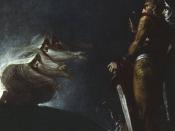"Fair is foul, and foul is fair." (Act I, Scene I, line 10) With this opening paradoxical quote, Shakespeare opens the tragedy of Macbeth. Macbeth is the tragic hero of this tragedy, as his ambitious actions place him in a downwards spiral until he loses everything that was once precious to him. He sacrifices his innocence, his conscience, and his peace of mind for the endless power and control he pursues. The introduction of the play begins with the description of a king under the pressures of war. Duncan, the king of Scotland, hears of Macbeth's bravery in battle against a Scot who took sides with the enemy. Scotland is currently at war with the King of Norway, and the country is rather divided, as traitors begin to surface. One such traitor, the Thane of Cawdor, was promptly arrested (and later hanged). As a reimbursement for his courageous demeanor, Duncan gives the title to an unknowing Macbeth.
Meanwhile, Macbeth and Banquo are on their journey to the castle and find themselves with three witches, who greet Macbeth as the "Thane of Cawdor." Immediately interested by this prophecy, Macbeth urges them to speak more...and his suppressed dreams of power begin to arise. It is this, Macbeth's aspirations of greatness that thrust him into power and his eventual death.
Macbeth's psychological position changes throughout this play. His psychological transition from innocent and loyal soldier towards a cruel and evil tyrant takes place in several stages. In Act I, we are shown a rather moral and ethical man, as Macbeth struggles with his conscience. The weird sisters' prophesy of his ascent to the throne truly troubles him, not only because his aspirations lead him there, but also because his mind cannot dare imagine the "horrible imaginings" (Act I, Scene III, line...


